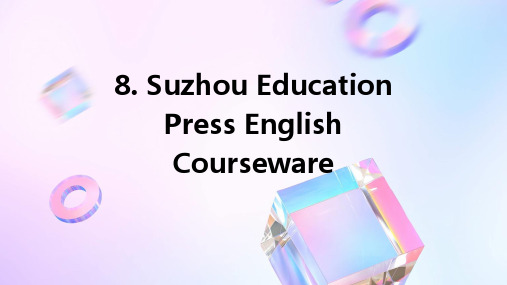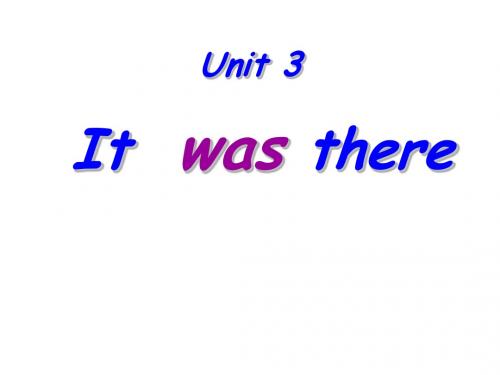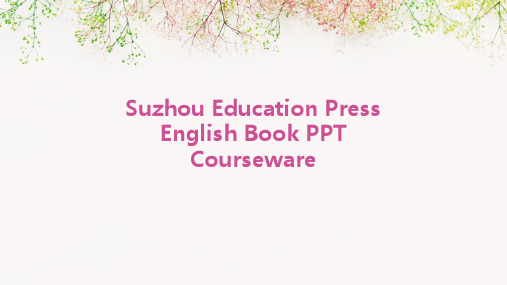最新苏教版英语课件
合集下载
苏教版四年级英语上册全套教学课件

Yes,I do. I have a cake here.
Do you like it?
Rhyme time
Little monkey Little monkey,in the tree, Little dog,run with me!(和我一起跑) Little cat,on the mat, (在地毯上) Little panda,cute and fat!
banana
How to say "你喜欢香蕉吗?"
Do you like these fruits? 你喜欢这些水果吗?
pineapple mango banana
grape
Let’s makea fruit salad.
notice
Let’s 常用来提出建议,意思是“我们…吧”。 如:Let’s go and play football.
Homework
1.完成部分同步探究练习 2.背诵----Sound time和Rhyme time
Unit 2
Let's make a fruit salad
• Story time
学习目标
Have a guess!猜一猜
I am a kind of fruit, yellow outside and white inside with small black seeds. What am I? 我是一种水果,外面黄色,里面白色,并且有小 黑籽。我是什么呢?
教学目标
1.能熟练听懂、会读、会拼写单词cat,dog,elephant,horse, lion,monkey,panda,tiger 2.能熟练听懂、会说、会读、会运用句型Do you like…?并且 会用Yes,I do.和No,I don’t 来回答。 3.能明白并理解名词的复数形式,理解like的后面用可数名词的 复数形式 4.能理解Would you like 和Do you like两个句型的使用方法 5.明白Cartoon time 的幽默之处
苏教版四年级英语上册全册课件

1.能熟练听懂、会读、会拼写本单元单词。 2.能熟练听懂、会说、会读、会运用本单元句型。 3.能初步会说本单元小诗:Little monkey 4.能理解并且会读/g/,能总结归纳过去所学单词
Review
对话练习
句型: Do you like? Yes,I do. No,I don’t. I like…
monkey 猴子
tiger 狮子
LWeat’tschtatlhke cartooAnre they on a farm?
WWhahtoaarereththeeyy?goingWtohetarelkaarebothuety?? 他们将要谈论些什么呢?
Story time
Try to say
教学目标
1.能熟练听懂、会读、会拼写单词cat,dog,elephant,horse, lion,monkey,panda,tiger 2.能熟练听懂、会说、会读、会运用句型Do you like…?并且 会用Yes,I do.和No,I don’t 来回答。 3.能明白并理解名词的复数形式,理解like的后面用可数名词的 复数形式 4.能理解Would you like 和Do you like两个句型的使用方法 5.明白Cartoon time 的幽默之处
我们去踢足球吧。
Let’s= Let us
fruit 水果 salad 沙拉
banana 香蕉
grape 葡萄
mango 芒果
pineapple 菠萝
看动画,回答问题 Story time
Story time What are Miss Li and her class doing?
李老师和她的学生在干什么呢?
cute and fat
Review
对话练习
句型: Do you like? Yes,I do. No,I don’t. I like…
monkey 猴子
tiger 狮子
LWeat’tschtatlhke cartooAnre they on a farm?
WWhahtoaarereththeeyy?goingWtohetarelkaarebothuety?? 他们将要谈论些什么呢?
Story time
Try to say
教学目标
1.能熟练听懂、会读、会拼写单词cat,dog,elephant,horse, lion,monkey,panda,tiger 2.能熟练听懂、会说、会读、会运用句型Do you like…?并且 会用Yes,I do.和No,I don’t 来回答。 3.能明白并理解名词的复数形式,理解like的后面用可数名词的 复数形式 4.能理解Would you like 和Do you like两个句型的使用方法 5.明白Cartoon time 的幽默之处
我们去踢足球吧。
Let’s= Let us
fruit 水果 salad 沙拉
banana 香蕉
grape 葡萄
mango 芒果
pineapple 菠萝
看动画,回答问题 Story time
Story time What are Miss Li and her class doing?
李老师和她的学生在干什么呢?
cute and fat
8下苏教版英语ppt课件ppt课件

3
Listening
Understanding podcasts, news reports, and lectures.
Course outline
Speaking
Giving formal presentations and participating in debates.
Reading
Reading academic texts and critical theory.
Cultural Understanding
To introduce students to different cultures and help them understand and appreciate global perspectives.
Critical Thinking
To foster students' analytical and critical thinking skills by encouraging them to question, evaluate, and synthesize information.
Contextual understanding
Understanding the meaning of words and phrases based on the context of the sentence or paragraph.
Pragmatic understanding
Understanding the implied meaning of words and phrases based on the social and cultural background.
03
最新苏教版英语课件

把下列句子改成一般过去时。 1.Today is Friday. ( Yesterday was Thursday.) 2.I’m fine today. 3.You’re late this morning. 4.Mrs. White is at home today. 5.Jack and her brother are not here. 6.The book isn’t on my desk. 7.You and your cousin aren’t ill. 8.Is Jack at his sister’s house? 9. Are you in the library? 10.Are they at school today?
Unit 3
It was there
Learn the new words:
• • • • • • Was Was not wasn’t Were Were not weren’t Was(原形) Were(原形)
Be动词的过去式(was or were)
单数 第一人称 第二人称 I You 复数
Examples: He was excited yesterday. (they) They were excited yesterday. 1.Mike was happy yesterday. ( Mike and I) 2.I was in the park yesterday afternoon. (we) 3.She was ill last week. (Nancy’s cousins) 4.Mr. Brown was at home this morning. (you ) 5.The teacher wasn’t walking just now. (the teachers) 6.Was Miss Li thirsty? (All the students ) 7.My mobile phone wasn’t on the bag. ( The glasses) 8.Was Jim’s new friend behind the door? (Jim’s new friends )
苏教版英语书ppt课件ppt课件

Weekly study plan
flexibility
The weekly study plan should have a certain degree of flexibility and be adjusted in a timely manner according to the learning situation of students to meet the learning needs of different students.
Teachers
The course provides teachers with less plans, teaching materials, and resources to make teaching more effective and engaging
02
Course Content Outline
Understanding details
Understanding and remembering specific details within a text
03
Teaching plan and arrangement
Weekly study plan
Clarity
The weekly study plan should clearly list learning objectives, content, methods, and time to ensure the progress and effectiveness of student learning.
Reading comprehension
Finding main idea
Drawing conclusions
苏教版四年级英语上册全套教学课件

Su Yang and Wang Bing
Wang Bing, do you have a banana? Yes, I do. Here you are. Thanks.
Let's make a fruit salad! 我们一起做一份水果沙拉吧!
Let's = Let us让我们...吧!我们一起...吧! make 做;制作 ~make a card ~make a paper plane
Unit1 I like dogs Story time
Welcome back to school!
动画欣赏
dog 小狗
dog dogs
I like dogs. 我喜欢小狗 Do you like dogs?
你喜欢小狗吗?
Do you like…?你喜欢…吗?
Yes, I do. 是的,我喜欢。 No, I don’t. I like…
我们去踢足球吧。
Let’s= Let us
fruit 水果 salad 沙拉
banana 香蕉
grape 葡萄
mango 芒果
pineapple 菠萝
看动画,回答问题 Story time
Story time What are Miss Li and her class doing?
李老师和她的学生在干什么呢?
择一种喜欢的方式读
一读课文。
Read and
act.(分角
Read
色读)
together.(
Read after 齐读)
one.
(跟一个学 生读)
Read by turns.
(轮流读)
Cartoon time
八下英语书苏教版ppt课件ppt

assignments
After school, go home, have dinner, and then rest
Part Two: A Busy Day
• Summary: Introduce the state of life during a busy day
Part Two: A Busy Day
My Favorite Subject: Science
Science is a very interesting and broad subject
It allows me to explore the world around me and understand how things work
Science can help me understand natural phenomena, so as why the sky is blue or why we have seasons
• Materials: The materials used in the course include visual aids, worksheets, and other relevant resources These materials are designed to enhance student learning and participation
Student Projects
Student projects are presented in the form of scenarios or role playing games These projects help students image their future selves in different situations and prepare them for potential challenges
After school, go home, have dinner, and then rest
Part Two: A Busy Day
• Summary: Introduce the state of life during a busy day
Part Two: A Busy Day
My Favorite Subject: Science
Science is a very interesting and broad subject
It allows me to explore the world around me and understand how things work
Science can help me understand natural phenomena, so as why the sky is blue or why we have seasons
• Materials: The materials used in the course include visual aids, worksheets, and other relevant resources These materials are designed to enhance student learning and participation
Student Projects
Student projects are presented in the form of scenarios or role playing games These projects help students image their future selves in different situations and prepare them for potential challenges
苏教版英语ppt课件

03
The remaining slides are divided into three sections: "Pre travel Preparation," "During Travel," and "Post travel Experience." Each section includes several slides with different sub topics
Overview of grammar rules
Noun
A noun is a countable or uncountable part of speech used to describe people, things, places, events, etc. Nouns usually have singular and plural forms.
CHAPTER 02
Vocabulary learning
Vocabulary List
A list of words and phrases that students need to learn, including synonyms, antonyms, and phrases
The list is based on the textbook and teaching objectives, and is updated regularly to meet the needs of different levels of students
CHAPTER 01
Unit Introduction
Unit Theme
The theme of the unit is "Exploring English through Travel" The courseware will guide students to use English to exchange and share travel experiences
- 1、下载文档前请自行甄别文档内容的完整性,平台不提供额外的编辑、内容补充、找答案等附加服务。
- 2、"仅部分预览"的文档,不可在线预览部分如存在完整性等问题,可反馈申请退款(可完整预览的文档不适用该条件!)。
- 3、如文档侵犯您的权益,请联系客服反馈,我们会尽快为您处理(人工客服工作时间:9:00-18:30)。
My father and mother Nancy’s brothers
was 与单数连用
His teachers We
You
用所给时间短语替换下列句子。 Examples: He is excited today. (yesterday) He was excited yesterday. 1.Mike is happy today. ( yesterday morning) 2.I am in the park now. (yesterday afternoon) 3.She is ill . (last week) 4.Mr. Brown is at home. ( at six o’clock) 5.The teacher isn’t walking now. ( just now) 6.Is Miss Li thirsty? (last Tuesday ) 7.My mobile phone isn’t on the bag. ( two days ago) 8.Is Jim’s new friend behind the door?( a moment ago)
was were was
We You
were were
第三人称
He She It
They were
He
She It Tom
My mother Her father His teacher
were 与复数连用
Nancy ‘s brother
They The students
Some dogs
Many birds
Examples: He was excited yesterday. (they) They were excited yesterday. 1.Mike was happy yesterday. ( Mike and I) 2.I was in the park yesterday afternoon. (we) 3.She was ill last week. (Nancy’s cousins) 4.Mr. Brown was at home this morning. (you ) 5.The teacher wasn’t walking just now. (the teachers) 6.Was Miss Li thirsty? (All the students ) 7.My mobile phone wasn’t on the bag. ( The glasses) 8.Was Jim’s new friend behind the door? (Jim’s new friends )
把下列句子改成一般过去时。 1.Today is Friday. ( Yesterday was Thursday.) 2.I’m fine today. 3.You’re late this morning. 4.Mrs. White is at home today. 5.Jack and her brother are not here. 6.The book isn’t on my desk. 7.You and your cousin aren’t ill. 8.Is Jack at his sister’s house? 9. Are you in the library? 10.Are they at school today?
Unit 3
It was there
Learn the new words:
• • • • • • Was Was not wasn’t Were Were not weren’t Wwas or were)
单数 第一人称 第二人称 I You 复数
